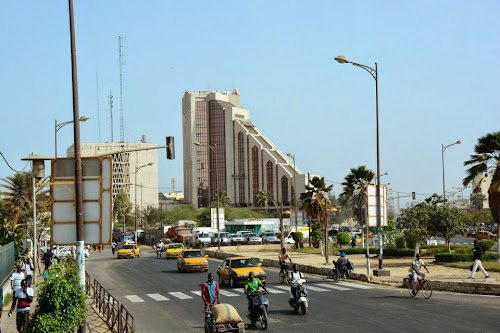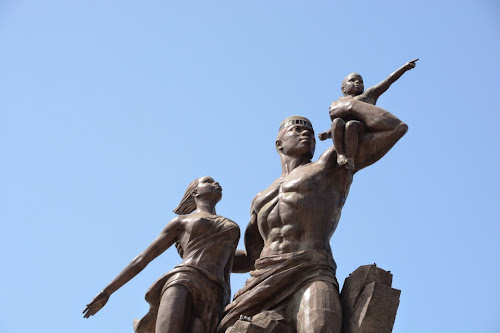We left the land of voodoo, villages and French bread for the land of the white bread, big cities and Christianity. Our next two stops would be totally different from what we had experienced so far on the trip. The question we were asking ourselves was: "would they be as interesting?"
We arrived in Ghana on a Sunday morning in the port city of Tema. Built in 1961, it is the principle port of Ghana and not particularly interesting or picturesque. As we disembarked the ship, there was no native folkloric group to greet us as in Benin and Togo, just the screeching of large cranes moving on their tracks and the banging of containers being loaded on ships.
Our first stop was to be an unusual casket company. It seems that Ghanan's like to be buried in caskets that represent something of their lives and this shop catered to that desire. On the way there, we had to suffer through a horrendous traffic jam caused by people going to and coming from church. Our guide took pride in telling us how religious the country was and that Christianity was the main religion practiced. The fact that it was church traffic didn't make the complaining from some the folks on the bus more Christian.
One of the pluses of the traffic was that I was able to take pictures of some of the signs along side the road. I find them to be very interesting and they give clues of what everyday life is about.
What really surprised us was to find that our friends the Lucky's had opened up a branch in Accra.
After the casket company, it was off to Downtown Accra and a visit to the memorial for Kwame Nkrumah. For such a small country, Ghana has played an important and commanding role in African history since the 11th century with the Ashanti tribe dominating the area. Whether in gold or slave trade these warriors held sway and weren't defeated until 1874.
Nkrumah brought independence to Ghana in 1957 through non violent means. Although revered as a world statesman, his socialist policies and poor administration didn't work and he was overthrown in a coup in 1966. The country stabilized in 1988 and today is one of the stronger democratic countries in Africa. His memorial tells quite a story of redemption from his ousting to his revival. The statue in the middle picture was found in a trash heap after the coup and fortunately saved by one of his devoted followers.
Sometimes cities captivate sometimes they don't. I regret to say Accra didn't. Maybe it was the lack of vibrancy because it was Sunday. Maybe it was the constant droning on and on by our British accented guide on subjects no one cared about. It certainly was clean and modern in parts and had it's shanty towns as well with street side commerce, but it had a buttoned up feel. The one time we felt almost in Africa was watching a folkloric dance and drumming show at a swank resort on the shores of the Atlantic narrated by a professor of Primitive Music for the University.
We saw no one on the street with a baguette....
Dakar was dauntingly alive. It could seem domesticated or dangerous, French or African at the same time. It was clean and modern and down and dirty within the same block. People live in high rises and hovels. You could eat in an elegant, French Cafe or on the street. Shop in department stores or street markets. The streets could be empty tree lined boulevards or traffic jammed nightmares. The people were friendly, but the touts and street merchants very aggressive. Building was going on everywhere and it was clear no zoning codes existed. It was a feast for the eyes and camera. So just let your imagination take you away to imagine the sounds and smells these sights would have produced.
.
One thing for sure, Dakar did not disappoint. It's a proud place that wants to point the way to the future for all Africans.






























No comments:
Post a Comment